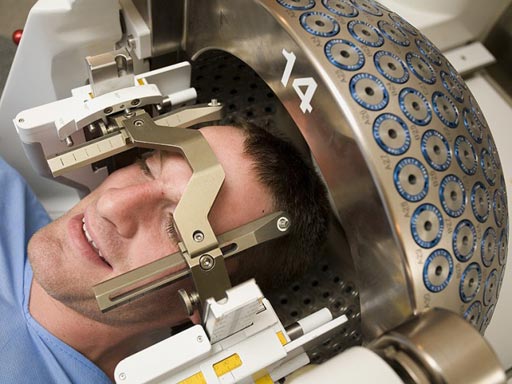Targeted Radiosurgery Superior to WBRT for Treating Brain Tumors
|
By MedImaging International staff writers Posted on 03 Mar 2017 |

Image: A patient undergoing SRS following brain surgery (Photo courtesy of DioMedia).
A new study suggests that stereotactic radiosurgery (SRS) provides better outcomes for patients with metastatic brain tumors than whole-brain radiation therapy (WBRT).
Researchers at the University of Missouri conducted a retrospective study among 83 patients who received post-surgical care for the removal of a metastatic brain tumor between January 2010 and December 2014; 46 of the patients received WBRT, while 37 others underwent SRS. The study compared patient data for local control, distant brain recurrence, overall survival, and radiation therapy complications.
The results showed that SRS controlled the spread of the cancerous cells as effectively as WBRT; in addition, the patients who received radiosurgery experienced less cognitive decline compared to those who received WBRT. Overall, 34% of the SRS patients experienced local recurrence, compared to 55% of WBRT patients; but the median survival rate for those patients receiving SRS was 440 days, compared to just 202 days for patients who received WBRT. The study was published on November 19, 2016, in Cureus.
“For patients with metastatic cancer of the brain, the importance of surviving for a longer period of time cannot be overstated,” said senior author Scott Litofsky, MD, chief of the division of nurological surgery at MU School of Medicine. “We now treat patients almost exclusively with radiosurgery following their surgery. Although this therapy does cost more, results often can be achieved in one to three visits, compared to 10 to 12 visits for whole-brain radiation. With these considerations, we strongly suggest physicians consider radiosurgery as an initial radiation treatment after surgery.”
Since WBRT treats the entire brain, it is thought to control tumor progression by treating identifiable metastases and otherwise unidentifiable micro-metastases. However, WBRT has become increasingly implicated with global cognitive impairment that persists after cessation of treatment, thereby expanding concerns regarding quality of life, despite reducing tumor burden. SRS delivers high-dose radiations to a discrete volume within the brain; because it spares healthy brain parenchyma, it confers a theoretically favorable alternative to WBRT, and is being increasingly utilized in the management of brain metastases.
Researchers at the University of Missouri conducted a retrospective study among 83 patients who received post-surgical care for the removal of a metastatic brain tumor between January 2010 and December 2014; 46 of the patients received WBRT, while 37 others underwent SRS. The study compared patient data for local control, distant brain recurrence, overall survival, and radiation therapy complications.
The results showed that SRS controlled the spread of the cancerous cells as effectively as WBRT; in addition, the patients who received radiosurgery experienced less cognitive decline compared to those who received WBRT. Overall, 34% of the SRS patients experienced local recurrence, compared to 55% of WBRT patients; but the median survival rate for those patients receiving SRS was 440 days, compared to just 202 days for patients who received WBRT. The study was published on November 19, 2016, in Cureus.
“For patients with metastatic cancer of the brain, the importance of surviving for a longer period of time cannot be overstated,” said senior author Scott Litofsky, MD, chief of the division of nurological surgery at MU School of Medicine. “We now treat patients almost exclusively with radiosurgery following their surgery. Although this therapy does cost more, results often can be achieved in one to three visits, compared to 10 to 12 visits for whole-brain radiation. With these considerations, we strongly suggest physicians consider radiosurgery as an initial radiation treatment after surgery.”
Since WBRT treats the entire brain, it is thought to control tumor progression by treating identifiable metastases and otherwise unidentifiable micro-metastases. However, WBRT has become increasingly implicated with global cognitive impairment that persists after cessation of treatment, thereby expanding concerns regarding quality of life, despite reducing tumor burden. SRS delivers high-dose radiations to a discrete volume within the brain; because it spares healthy brain parenchyma, it confers a theoretically favorable alternative to WBRT, and is being increasingly utilized in the management of brain metastases.
Latest Nuclear Medicine News
- New PET Biomarker Predicts Success of Immune Checkpoint Blockade Therapy
- New PET Agent Rapidly and Accurately Visualizes Lesions in Clear Cell Renal Cell Carcinoma Patients
- New Imaging Technique Monitors Inflammation Disorders without Radiation Exposure
- New SPECT/CT Technique Could Change Imaging Practices and Increase Patient Access
- New Radiotheranostic System Detects and Treats Ovarian Cancer Noninvasively
- AI System Automatically and Reliably Detects Cardiac Amyloidosis Using Scintigraphy Imaging
- Early 30-Minute Dynamic FDG-PET Acquisition Could Halve Lung Scan Times
- New Method for Triggering and Imaging Seizures to Help Guide Epilepsy Surgery
- Radioguided Surgery Accurately Detects and Removes Metastatic Lymph Nodes in Prostate Cancer Patients
- New PET Tracer Detects Inflammatory Arthritis Before Symptoms Appear
- Novel PET Tracer Enhances Lesion Detection in Medullary Thyroid Cancer
- Targeted Therapy Delivers Radiation Directly To Cells in Hard-To-Treat Cancers
- New PET Tracer Noninvasively Identifies Cancer Gene Mutation for More Precise Diagnosis
- Algorithm Predicts Prostate Cancer Recurrence in Patients Treated by Radiation Therapy
- Novel PET Imaging Tracer Noninvasively Identifies Cancer Gene Mutation for More Precise Diagnosis
- Ultrafast Laser Technology to Improve Cancer Treatment
Channels
Radiography
view channel
Novel Breast Imaging System Proves As Effective As Mammography
Breast cancer remains the most frequently diagnosed cancer among women. It is projected that one in eight women will be diagnosed with breast cancer during her lifetime, and one in 42 women who turn 50... Read more
AI Assistance Improves Breast-Cancer Screening by Reducing False Positives
Radiologists typically detect one case of cancer for every 200 mammograms reviewed. However, these evaluations often result in false positives, leading to unnecessary patient recalls for additional testing,... Read moreMRI
view channel
Low-Cost Whole-Body MRI Device Combined with AI Generates High-Quality Results
Magnetic Resonance Imaging (MRI) has significantly transformed healthcare, providing a noninvasive, radiation-free method for detailed imaging. It is especially promising for the future of medical diagnosis... Read more
World's First Whole-Body Ultra-High Field MRI Officially Comes To Market
The world's first whole-body ultra-high field (UHF) MRI has officially come to market, marking a remarkable advancement in diagnostic radiology. United Imaging (Shanghai, China) has secured clearance from the U.... Read moreUltrasound
view channel.jpg)
Diagnostic System Automatically Analyzes TTE Images to Identify Congenital Heart Disease
Congenital heart disease (CHD) is one of the most prevalent congenital anomalies worldwide, presenting substantial health and financial challenges for affected patients. Early detection and treatment of... Read more
Super-Resolution Imaging Technique Could Improve Evaluation of Cardiac Conditions
The heart depends on efficient blood circulation to pump blood throughout the body, delivering oxygen to tissues and removing carbon dioxide and waste. Yet, when heart vessels are damaged, it can disrupt... Read more
First AI-Powered POC Ultrasound Diagnostic Solution Helps Prioritize Cases Based On Severity
Ultrasound scans are essential for identifying and diagnosing various medical conditions, but often, patients must wait weeks or months for results due to a shortage of qualified medical professionals... Read moreGeneral/Advanced Imaging
view channelBone Density Test Uses Existing CT Images to Predict Fractures
Osteoporotic fractures are not only devastating and deadly, especially hip fractures, but also impose significant costs. They rank among the top chronic diseases in terms of disability-adjusted life years... Read more
AI Predicts Cardiac Risk and Mortality from Routine Chest CT Scans
Heart disease remains the leading cause of death and is largely preventable, yet many individuals are unaware of their risk until it becomes severe. Early detection through screening can reveal heart issues,... Read moreImaging IT
view channel
New Google Cloud Medical Imaging Suite Makes Imaging Healthcare Data More Accessible
Medical imaging is a critical tool used to diagnose patients, and there are billions of medical images scanned globally each year. Imaging data accounts for about 90% of all healthcare data1 and, until... Read more
Global AI in Medical Diagnostics Market to Be Driven by Demand for Image Recognition in Radiology
The global artificial intelligence (AI) in medical diagnostics market is expanding with early disease detection being one of its key applications and image recognition becoming a compelling consumer proposition... Read moreIndustry News
view channel
Hologic Acquires UK-Based Breast Surgical Guidance Company Endomagnetics Ltd.
Hologic, Inc. (Marlborough, MA, USA) has entered into a definitive agreement to acquire Endomagnetics Ltd. (Cambridge, UK), a privately held developer of breast cancer surgery technologies, for approximately... Read more
Bayer and Google Partner on New AI Product for Radiologists
Medical imaging data comprises around 90% of all healthcare data, and it is a highly complex and rich clinical data modality and serves as a vital tool for diagnosing patients. Each year, billions of medical... Read more





















